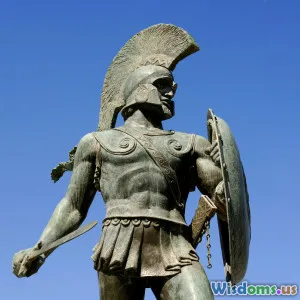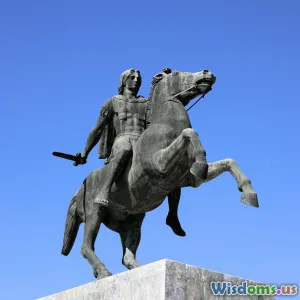
Alexander the Great’s Leadership Secrets Explained
14 min read Discover the key leadership strategies and tactics of Alexander the Great that shaped his legendary legacy. (0 Reviews)
Alexander the Great’s Leadership Secrets Explained
Alexander the Great, born in 356 BCE, is widely regarded as one of the most influential leaders in world history. By the age of 30, he had forged one of the largest empires ever seen, stretching from Greece to Egypt and as far east as India. While countless books and studies dissect his military tactics, his leadership qualities remain some of the most instructive lessons for modern professionals and aspiring leaders. This article delves into Alexander’s leadership secrets, exploring how his methods transcend time, and what actionable strategies we can adopt from the legendary conqueror today.
Visionary Thinking: Charting the Course Beyond the Horizon

Alexander’s ambitions were not merely grand—they reshaped the world’s political and cultural landscape. As a young king succeeding his father Philip II, Alexander envisioned not just conquering territories, but creating a unified, multicultural empire. His decision to aim eastward into Persia, rather than merely consolidate gains in Greece, stemmed from an audacious vision that startled even his most seasoned generals.
Lessons in Visionary Leadership:
- Think Beyond the Present: Modern professionals can draw on Alexander’s willingness to go far beyond the known boundaries. In business, this means looking at market trends, technological advancements, and emerging territories, instead of sticking with comfort zones.
- Boldness Attracts Talent: The very scale of Alexander’s dreams attracted daring minds and followers. By articulating a compelling vision, leaders today can galvanize teams and create lasting loyalty.
- Communicate the Vision Clearly: Alexander was famous for gathering his troops before pivotal battles, painting a picture of their shared destiny. Like CEO town halls or company all-hands, clear and repeat communication keeps teams aligned and motivated.
Example: Modern business leaders like Elon Musk continually inspire teams with bold visions—Mars colonization or traffic-reducing tunnels—emphasizing that impact is seldom gained from incremental thinking alone.
Unparalleled Adaptability: Innovation in the Face of Uncertainty

Alexander inherited Philp II’s powerful Macedonian phalanx infantry, but he soon realized static tactics would not suffice against unpredictable foes. At the Battle of Gaugamela (331 BCE), Darius III’s Persian forces outnumbered Alexander’s by some estimates more than four to one. Instead of a frontal assault, Alexander outflanked his enemy with a feigned retreat, redefining the battle’s tempo and securing a classic victory.
Key takeaways:
- Cultivate Agility: In today’s rapidly changing markets, the willingness to pivot—whether changing product lines, marketing strategies, or organizational structure—creates resilience.
- Learn from All Adversaries: Alexander adopted not just Persian tactics when useful, but also built on local knowledge across his empire. Today’s leaders leverage market intelligence and cross-industrial insights to innovate ahead of the competition.
- Decentralize Decision Making: Empowering sub-commanders (like Parmenion and Hephaestion) allowed for faster battlefield adjustments; similarly, empowering mid-level managers today accelerates adaptive responses.
Example: Netflix’s pivot from DVD rentals to streaming, and again into original content creation, echoes this adaptability principle. The ability to iterate and realign strategies is a hallmark of enduring organizations.
Leading by Example: Earning Loyalty through Deeds

Unlike distant monarchs, Alexander led from the front. Wounded multiple times in battle—including a near-fatal spear wound at the Mallian fortress in India—he never asked troops to face risks he wouldn't shoulder himself. This approach cemented deep loyalty among officers and foot soldiers alike.
Practical leadership applications:
- Demonstrate Commitment: Employees at all levels are inspired when leadership shares in hardships. During crises, leaders who "roll up their sleeves" foster trust and camaraderie.
- Do What You Ask of Others: Setting the example sets the standard. Whether it's tackling tough projects or practicing company values, visible integrity and bravery win the long game.
Tip: Organize regular sessions where senior leadership participates in day-to-day challenges. Google’s tradition of tech leads participating in code sprints, or manufacturing managers working production lines, reinforce this Alexanderine principle.
Uniting Diverse Groups: The Art of Building One Empire

Alexander didn’t merely conquer; he famously strove to bring diverse peoples into the fold. He married Roxana of Bactria and encouraged mass marriages between Macedonian officers and Persian women at Susa. He adopted elements of Persian dress and ritual, and promoted Persians to high administrative posts, breaking Greek exclusivity. This fusion, called syncretism, was radical for its time—and ensured conquered peoples were stakeholders, not just subjugated subjects.
Strategies for Modern Leaders:
- Cultivate Inclusive Cultures: Embrace diversity in hiring, collaboration, and promotions. Value perspectives from different backgrounds instead of imposing conformity.
- Invest in Cross-functional Teams: Drawing talent from engineering, sales, operations, and creative teams fosters innovation—much like Alexander mixed Macedonian and Persian leadership.
- Symbolize Unity: Alexander’s public gestures—like integrating foreign customs at court—reduced resistance and boosted cooperation. Today, organizational rituals, internal communications, and intercultural exchanges cultivate belonging.
Fact: According to McKinsey’s 2020 Diversity Wins report, organizations in the top quartile for ethnic and cultural diversity outperformed those in the bottom quartile by 36% in profitability—real-world proof of ‘empire-building’ at its finest.
Relentless Pursuit of Knowledge: Learning as Leadership

Educated by Aristotle, Alexander’s thirst for knowledge defined his reign. During his campaigns, he would bring scientists, historians, and philosophers, commissioning studies of unknown plants, animals, and customs. He founded cities that became centers of learning—Alexandria being the most famous.
How leaders can learn from this:
- Make Learning Continuous: Encourage ongoing professional development; sponsor workshops, online courses, or invite external speakers for company-wide sessions.
- Hire for Curiosity: Attract leaders eager to ask questions, challenge assumptions, and push intellectual boundaries, not just technical excellence.
- Cross-disciplinary Exploration: Like Alexander’s entourage, benefit from insights outside one’s own field—be it customer experience, design thinking, or behavioral psychology.
Example: The best tech firms build internal labs and run hackathons not only to develop new products, but to foster the intellectual curiosity that Alexander so prized.
Personal Charisma: The X-Factor in Command

Perhaps no leader in antiquity possessed charisma on Alexander’s scale. From his youth—tampering the wild horse Bucephalus through sheer confidence—to his rousing speeches before the Battle of Issus or his tearful appeals when his soldiers refused to go further into India, Alexander understood the power of personal magnetism.
Developing Charisma in Leadership:
- Master Storytelling: Paint compelling narratives about organizational purpose and vision, just as Alexander did for his campaigns.
- Show Authentic Emotion: Real connection transcends mere logic. Express both strength and vulnerability where appropriate.
- Engage Directly: Alexander wasn’t aloof; he dined with officers, learned their names, and shared their burdens—mirroring modern managers building rapport with every level of their organizations.
Fact: Great communicators drive organizational performance. According to Gallup, teams that feel heard and inspired by leaders report 21% higher profitability.
Strategic Risk-Taking: Calculated Daring Pays Dividends

Alexander’s entire career was one of against-the-odds gambles: crossing the Hellespont with just 37,000 men versus millions in the Persian Empire; charging prematurely into gaps in enemy lines or executing night marches. Yet, most of his gambles were grounded in extraordinary intelligence-gathering, quick calculation, and the willingness to refuse defeat.
How leaders can take calculated risks:
- Do Your Homework: Invest in robust data and scenario planning before major moves.
- Act Decisively: Once certain, commit; wavering in moments of crisis often leads to disaster.
- Fail, Learn, Repeat: Alexander’s setbacks—like the bloody Siege of Tyre—never deterred him, but refocused his strategy. Organizations that ‘fail fast and learn’ adapt best to competition.
Corporate parallel: Amazon’s forays into hardware (like Kindle and Fire) involved risk, but methodical testing and willingness to recover from missteps (remember the failed Fire Phone?) paved the way for future innovations.
Legacy Mindset: Creating Impact That Endures

While Alexander’s empire fragmented after his death in 323 BCE, his quest changed world history. Hellenistic cities spread Greek culture, science, and commerce; his name graces cities from Egypt (Alexandria) to modern-day Pakistan (Alexandria on the Indus). The loss of a cohesive empire did not erase the imprint of his vision—proof a dedicated leader can alter the course of civilizations.
Building Legacy in Modern Leadership:
- Focus on Systems, Not Just Leaders: Alexander created educational hubs, infrastructure, and diverse governance models—the foundation for Latin, Islamic, and modern Western scholarship alike.
- Mentor Future Leaders: Succession planning and active mentorship ensure values and vision outlast any one career.
- Promote Institutional Stability: Invest in policies and processes that persist beyond individual tenures. In organizations, leaders who view themselves as stewards versus kings leave systems that flourish decades later.
Fact: Harvard Business Review notes companies with robust organizational cultures and internal development pipelines are 1.5 times more likely to outperform their peers—proof that empire-building mindsets pay off.
The leadership secrets of Alexander the Great—vision, adaptability, leading by example, embracing diversity, relentless learning, personal charisma, calculated risk, and a focus on legacy—remain as relevant in the boardroom and workspaces today as on ancient battlefields. Regardless of industry or generation, adopting even a fraction of these proven principles can turn ordinary careers into world-changing journeys. Whichever 'empire' you aspire to build, let Alexander’s blend of audacity and wisdom light the path ahead.
Rate the Post
User Reviews
Popular Posts
















